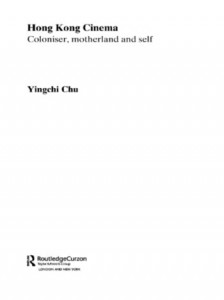Hong Kong Cinema
Coloniser, Motherland and Self
by Yingchi Chu


Average rating: ![]()
| 0 | rating | |
| 0 | rating | |
| 0 | rating | |
| 0 | rating |
Your rating: -
Book Presentation:
Examining Hong Kong cinema from its inception in 1913 to the end of the colonial era, this work explains the key areas of production, market, film products and critical traditions. Hong Kong Cinema considers the different political formations of Hong Kong's culture as seen through the cinema, and deals with the historical, political, economic and cultural relations between Hong Kong cinema and other Chinese film industries on the mainland, as well as in Taiwan and South-East Asia. Discussion covers the concept of 'national cinema' in the context of Hong Kong's status as a quasi-nation with strong links to both the 'motherland' (China) and the 'coloniser' (Britain), and also argues that Hong Kong cinema is a national cinema only in an incomplete and ambiguous sense.
About the Author:
Yingchi Chu is a lecturer in Chinese and Film Studies at the School of Asian Studies, Murdoch University, Western Australia
Press Reviews:
'This well researched book, its exhaustive bibliography and a handy and useful glossary and filmography (in Chinese and English) - is an important tool allowing readers to grasp how, in the very particular and exceptional case of Hong Kong, its cinema both embodies and transcends our received idea of what constitutes a national cinematic art.' - Cinemaya
'Hong Kong Cinema is an ambitious, thought-provoking book and contains some fascinating material on the film industry in 1980-2000.' - China Quarterly
See the publisher website: Routledge
> From the same author:
> On a related topic:
Hong Kong Crime Films (2023)
Criminal Realism, Censorship and Society, 1947-1986
Experts in Action (2021)
Transnational Hong Kong-Style Stunt Work and Performance
A Companion to Hong Kong Cinema (2020)
Dir. Esther M. K. Cheung, Gina Marchetti and Esther Yau
The Other Side of Glamour (2020)
The Left-Wing Studio Network in Hong Kong Cinema in the Cold War Era and Beyond